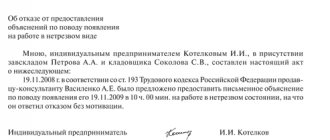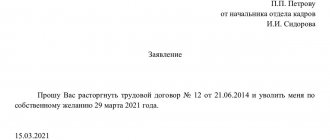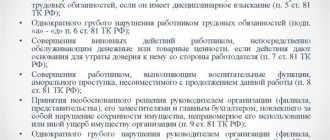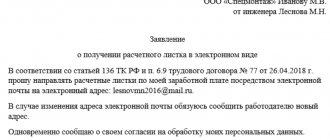Can they fire me for 3 explanations about being late?
Hello!
You can be fired not for the third explanatory note, but for the third, i.e. repeated violation of labor discipline. Refusal to write an explanatory note does not mean that disciplinary action cannot be imposed on you. And it may well be dismissal in accordance with paragraph 5 of Art. 81 of the Labor Code of the Russian Federation: repeated failure by an employee to fulfill labor duties without good reason, if he has a disciplinary sanction. You have already had two penalties within a year.
For reference: Article 193 of the Labor Code of the Russian Federation:
“Before imposing a disciplinary sanction, the employer must request a written explanation from the employee. If after two working days the employee does not provide the specified explanation, then a corresponding act is drawn up.
Failure by an employee to provide an explanation is not an obstacle to applying disciplinary action.
Disciplinary action is applied no later than one month from the date of discovery of the misconduct, not counting the time of illness of the employee, his stay on vacation, as well as the time necessary to take into account the opinion of the representative body of employees.
A disciplinary sanction cannot be applied later than six months from the date of commission of the offense, and based on the results of an audit, inspection of financial and economic activities or an audit - later than two years from the date of its commission. The specified time limits do not include the time of criminal proceedings.
For each disciplinary offense, only one disciplinary sanction can be applied.
The employer's order (instruction) to apply a disciplinary sanction is announced to the employee against signature within three working days from the date of its publication, not counting the time the employee is absent from work. If the employee refuses to familiarize himself with the specified order (instruction) against signature, then a corresponding act is drawn up.
A disciplinary sanction can be appealed by an employee to the state labor inspectorate and (or) bodies for the consideration of individual labor disputes. »
Article 194. Removal of disciplinary sanctions
If within a year from the date of application of the disciplinary sanction the employee is not subject to a new disciplinary sanction, then he is considered to have no disciplinary sanction.
The employer, before the expiration of a year from the date of application of the disciplinary sanction, has the right to remove it from the employee on his own initiative, at the request of the employee himself, at the request of his immediate supervisor or a representative body of employees.
Sincerely, Sorokina Yu.A.
Many employers tell their employees that if they have three explanations, this will automatically lead to termination of the employment relationship. Is it really?
Is it necessary to explain yourself in writing to your employer?
An explanatory note is necessary to show the connection between the violation committed by the employee and its causes.
There is no unified form of the document, but the manager has the right to approve it with the help of the organization’s regulations.
At the same time, the Labor Code of the Russian Federation does not indicate what reasons for violation of labor discipline can be considered valid. Therefore, the manager considers each case individually and makes decisions regarding the events at his own discretion.
The employer's request for an explanation from the employee must also be submitted in writing in two copies:
- one for the guilty subordinate;
- the other is for the HR department.
The employee’s signature on the copy for HR officers confirms receipt of the request and familiarization with the document.
The explanatory note must be provided to the management of the organization within two working days. The employee may remain inactive during this period or give a written refusal to the employer. In both cases, an act will be drawn up recording the employee’s disagreement with the explanatory note. This document will subsequently serve as the basis for ordering disciplinary action.
An explanatory note in electronic form without an employee’s personal signature is not a personnel document.
What is explanatory?
The Labor Code of the Russian Federation does not define this concept. But you can “decipher” it as follows: an explanatory note is a kind of note that the guilty employee writes to the employer, setting out in the document the reasons for what happened during the working day. Anything could happen:
- some kind of emergency;
- violation of labor discipline;
- non-compliance with labor protection, resulting in certain negative consequences;
- committing an administrative offense or even a crime.
An employee who is the culprit or witness to something like this, or who is the alleged culprit, gives an explanation of what happened. Should he do this?
When is it necessary to write an explanatory note, and is this the employee’s responsibility?
Art. 193 of the Labor Code of the Russian Federation states that the employer, if a violation of a disciplinary offense is detected, must require an explanatory statement from the employee. But the company employee himself has no obligation to make excuses. You can ignore this requirement. What to do?
There are several points of view on this matter:
- It's better not to write anything. As the saying goes: “Whatever you say can be used against you.”
- In any case, it is necessary to write an explanatory note. If you ignore the employer’s demand, he will consider the employee to be guilty.
We recommend sticking to the second point of view. If the boss requires you to write an explanatory note, then it is better to do so. In the document you need to outline your vision of the situation, give arguments in your favor, and report evidence that indicates the employee’s innocence.
Some, however, are afraid to write explanatory notes because they believe that they could be fired.
Can an employer expel an employee from the organization for giving explanations?
Let's turn to Art. 81 Labor Code of the Russian Federation. It talks about the grounds for dismissing an employee on the initiative of the head of the company. Among them there is no such thing as writing one or more explanatory notes.
This is because such notes themselves do not get you fired. An employer may initiate termination of an employment contract if an employee:
- grossly violated labor discipline once;
- committed several minor offenses;
- missed work (was not present at the organization for 4 hours);
- appeared in the organization in a state of intoxication, and so on.
In this case, the employer must conduct an investigation into the fact of the incident, draw up a report, prepare a dismissal order, if there are grounds, and also familiarize the employee with it.
If a serious offense has been committed
Violations such as absenteeism and appearing in a state of intoxication were mentioned above. These are serious offenses for which you will be fired immediately. The employer, when carrying out an “investigation,” requires an explanatory statement from the employee.
Thus, in this case, they can fire you with just one note.
If the violation is less serious
Repeated failure to fulfill official duties, if the employee already has a disciplinary sanction, is, in accordance with Art. 81 of the Labor Code of the Russian Federation, grounds for dismissal of an employee.
Art. 192 of the Labor Code of the Russian Federation indicates that the employer may apply the following penalties:
- warning;
- rebuke;
- dismissal.
Thus, if in a particular case the employee’s guilt is established, and all the necessary documents are available about this, then it is indeed possible to fire him for three explanations.
It is possible to “fly out” of the organization for less explanatory reasons. After all, in Art. 81 of the Labor Code of the Russian Federation states that the following can be fired:
- for repeated failure to fulfill duties;
- if there is a penalty.
That is, in simple terms:
- A person must fail to perform duties at least twice.
- He must have a valid penalty. Which one is not important. The main thing is to know: according to Art. 194 of the Labor Code of the Russian Federation, the imposed penalty is valid for 1 year, unless the employer removes it earlier.
It turns out that it is possible to dismiss an employee, under the specified circumstances, even for a second explanatory note.
As a result, the employment contract is terminated without explanation. There can be, roughly speaking, 10 or 20 pieces, and if there are grounds provided for in Art. 81 Labor Code of the Russian Federation. If one of these grounds is missing, and the employer issues an order to dismiss the employee, then he has clearly violated the law.
>Video on the topic
How to act correctly if you are asked to write an explanatory note:
Document preparation
The document in which the employee describes the reasons for his misconduct comes into force only after it is certified by the signature of the boss and registered in accordance with all provisions of the law. An employee can be fired for explanatory notes only if profanity was used in writing them or there is a direct insult to the person to whom the note is addressed. If the paper is drawn up according to all the rules, then it cannot influence leaving work. Structure of the explanatory note:
- Full name of the addressee and full name of the organization;
- Full name of the compiler;
- main text describing the reasons for the violation and their justification;
- date and signature.
Requirements for document execution at different enterprises may differ, but there are basic text formats that must be strictly observed:
- The explanation must clearly describe all the circumstances of the violation and the reasons why it occurred.
- The signature must have a transcript indicating the name and position of the originator.
- If there is documentary evidence of non-involvement in the violation, then the note must contain an appendix in which they must be indicated.
It should be noted that if the enterprise has already adopted a certain format for issuing explanatory notes, this does not oblige the employee to strictly follow it. The approved form of a document is not a guarantee of its validity. Registration is required for this.
Normative base
The Labor Code provides for three main reasons for termination of an employment contract:
- employee's desire, Art. 80 TK;
- initiative of the administration, art. 81 TK;
- mutual consent, Art. 78 TK.
If an employer has justified complaints against an employee, then the code gives him the right to bring the offender to disciplinary liability, Art. 192 TK. This can be expressed in the form of a reprimand, reprimand or dismissal. The form of punishment is determined by the employer himself, based on his idea of the severity of the offense and the circumstances of its commission.
In order to ensure objectivity when making a decision, the law obliges the employer to first demand from the employee an explanation of the reasons for his behavior, and gives the employee the right to appeal the employer’s actions, Art. 193 TK. A correct assessment of the situation is especially important when imposing a penalty in the form of dismissal on the basis of clause 5 of Art. 81 TK.
This paragraph indicates repeated violation of labor duties. Based on the rules of the Russian language and normal logic, it is assumed that there should be more than one evidence of neglect of work. How many reprimands are needed to dismiss an employee, and what their nature should be, is not specified in the code, so those with at least one reprimand should think about the possible consequences.
A second violation of the job description, without justifiable reasons or due to intent, may result in dismissal at the initiative of management.
Dismissal due to reprimands
Article 81 of the Labor Code describes in detail cases when an employer can terminate an employment relationship without the employee’s desire. However, this does not mean that the employee’s opinion will not be asked. The requirement for a mandatory explanation of the employee’s point of view or circumstances before bringing him to disciplinary liability is contained in Art. 193 TK. You need to approach the issue of requesting a written explanation especially carefully when, based on the results of a review of the specialist’s actions, it is decided to dismiss him.
Some of the reasons from Art. 81 of the Labor Code provide for the possibility of dismissal without penalties, on the basis of other documents. But there are grounds that imply that for misconduct you can either be reprimanded or fired:
- repeated violation or failure to fulfill labor duties, clause 5 of Art. 81 TK;
- gross violation, even a single violation, of work duties and labor discipline (absenteeism, drinking alcohol, theft, disclosure of confidential data, etc.), clause 6 of Art. 81 TK;
- commission of an immoral offense by a teacher, clause 8 of Article 81 of the Labor Code;
- making an unreasonable decision by the manager, which resulted in harm to the company, clause 9 of Art. 81 TK
The greatest number of questions arise regarding the concept of “repeated failure to fulfill” duties and how many reprimands are enough for dismissal. At least two scenarios are possible. First, the employee systematically commits negligence, and the employer suffers. Second, the employer, for some reason, evaluates the work of the unwanted specialist too pickily and intends to make room.
Negligence or Harassment
| The employee is truly negligent | An employee is being harassed by superiors | |
| First penalty | It is impossible to dismiss for the first case of failure to perform duties, unless it is classified as gross. The maximum punishment is a reprimand. When announcing it, it is necessary to take into account the employee’s explanations, Art. 193 TK | Even if the boss has firmly decided to reprimand, it is necessary to carefully and fully disclose the circumstances justifying the employee in the text of the explanatory note. If the guilt is obvious, then try to make repentance touch the soul of the leader or supervisory authority. |
| Repeated offense | Already the second case of non-compliance with a work instruction may fall under the concept of “repeated”. But the employer must understand how many valid reprimands there must be for dismissal. If the problem arose due to a lukewarm attitude towards work, and its reasons cannot be attributed to valid reasons, then the employer may not accumulate penalties. Instead, the manager has the right to immediately initiate dismissal. True, if more than 365 days have not passed since the first punishment was imposed, Art. 194 TK. | If troubles at work were the result of a mistake or some difficult life circumstances, then management will not be able to prove in court the validity of such harsh disciplinary action as dismissal “under the article”. The maximum possible option is a new reprimand. After all, in paragraph 5 of Art. 81 of the Labor Code clearly states that failure to fulfill duties must be intentional, without good reason. An error is considered to be an unfavorable development of events due to a conscientious error in the performance of one’s work. |
| Dismissal | To ensure that dismissal under such a “bad” article does not become the subject of litigation in court and does not lead to the person’s reinstatement, you need to take care not only of drawing up explanations, acts and orders, but also collect documents confirming the severity of the consequences of the employee’s actions for the company. | Illegal dismissal is not a reason to get upset and give up. If an order is issued, but the employee has reason to believe that the contract with him was terminated for subjective reasons, then he needs to prepare reasons for his arguments for the court and file a claim for reinstatement at work within a month from the date of delivery of the dismissal order, Art. 392 TK. |
Procedure
The procedure for action in the event of a repeated case of failure to fulfill obligations coincides with that set out in Art. 193 TK:
- Detection of negligence and its documentation.
- Requesting explanations from a specialist.
- Drawing up a refusal to explain, if this took place, in the presence of witnesses.
- Assessing the essence of explanations.
- Deciding on the type of recovery. If the previous punishment has not expired, then dismissal may become a new one.
- Issuance of an order to impose disciplinary liability in the form of dismissal. In this case, no reprimand is given.
If they decide to dismiss an employee under clause 5 or 6 of Art. 81, then he can no longer be reprimanded or reprimanded, Art. 193 TK.
Practice
Do not forget that dismissal is a last resort, the most severe punishment provided for by labor legislation. This is why you cannot part with an employee simply because he was late for work for the second time in a year, even if the employer really wants it. The reasons for essentially expelling an employee from the team must be so convincing that the labor inspectorate and the court do not doubt their gravity and incompatibility with the continuation of work.
Rarely do any employees decide to find a practical answer to the question of how many reprimands can there be before dismissal? Usually, the parties prefer to reach an agreement and part ways quietly, with standard wording in the work book. But if the case does take a very unfavorable turn, then the employee can try to defend himself in court. The percentage of positive determinations in labor disputes should inspire optimism among workers.
It is clear that reinstatement at work by decision of the panel of judges will not improve relations with the authorities. But this needs to be done for several reasons:
- restoration of a good name and professional reputation, because the circumstances of dismissal are briefly stated in the labor report;
- a positive court decision will allow you to receive average earnings during the forced absence;
- an unfavorable outcome of an individual dispute disciplines the employer in further behavior with employees.
Additional advice for those employees who are faced with the arbitrariness of their superiors. There is no need to hide from the director's written demands. Refusal to receive them will not become an obstacle to further prosecution, and the employee will not have a document in his hands with which to go to the authorities. You must also remember that it is better to hand over your written explanations against the signature on the second copy. This alone can cool the ardor of an irrepressible leader. In addition, if you are faced with an obvious violation of your rights, you must definitely complain to the labor inspectorate.
In practice, it is quite difficult to bring about dismissal due to poor performance. Only if the specialist really ignores the requirements of discipline or work instructions. Moreover, you should not start this process if the desire to terminate the employment contract is dictated by personal hostility towards the employee.
Zinovieva Natalya Igorevna
Lawyer at the Legal Defense Board. Specializes in handling cases related to labor disputes. Defense in court, preparation of claims and other regulatory documents to regulatory authorities.
Still have questions on the topic Ask a lawyer
Registration forms
An explanatory note is a document containing information. Such documents must be kept in archives for at least thirty years. To make it easier to search for information documents, firms and enterprises usually use one of three types of registration:
- magazine;
- card;
- electronic.
The journal registration form involves entering the explanatory note number into a special list and is quite common in small organizations.
If there are few employees, then this method of registration is very convenient, as it allows you to quickly find the required document. However, this form has a significant drawback. Registration of a document and management's response to it are often documented in different journals, and this can greatly increase the search time. The card form allows you to significantly speed up the registration process, since several employees can work simultaneously and independently of each other. This method has only one drawback - the cards may get lost. Keeping track of a large number of paper documents can be very difficult, especially if the company has a high staff turnover.
The electronic registration form is considered the most effective. It significantly speeds up the process of processing documents, while their damage or loss is practically excluded. You can find the required explanatory note number in the electronic database and print the document within 5-10 minutes.
Regardless of the method, when registering an explanatory note, the number, date, name of the document and its title must be indicated.
How many explanations are needed for dismissal?
We welcome you to the forum of HR professionals and newcomers to HR. Dear colleagues! There are already more than 250,000 messages on our forum, more than 26,000 topics, and most importantly, we always have an excellent team and a spirit of mutual assistance.
Newbie guests please USE THE FORUM SEARCH! Most questions have already been answered. Please be mutually polite.
Our forum is for pleasant professional communication, cooperation and mutual assistance.







